
I am a higher level Theater student. I didn’t start out this way- at the start of eleventh grade, theater was one of my standard level subjects.To get the IB diploma, students must take three subjects at a higher level. This means that you need to pick which three subjects you are most interested in or you think will be most useful to you. At the end of tenth grade I picked Economics, Literature and Math.
I started doing higher level math on a course that was essentially pure math, focused on equations and algebra. I didn’t like this course very much, because I am much more interested in statistics and probability- in my spare time I read about economics and politics, two very stat and probability heavy areas. Unfortunately, OSC doesn’t offer a statistics or probability course at a higher level, so if I wanted to switch I would need to pick a new class to be my third HL. For various reasons, the only one of my subjects that worked was theater, so I became an HL theater kid. Theater is by far and away the art subject I enjoy the most, and also ties in fairly well to a career in the political space. Knowing how to give a speech and be compelling on stage is valuable if you want to run for office.
Every year, OSC sends a group of students to what is called the International Schools Theater Association (ISTA). ISTA is a series of workshops on theater run by various field experts, with students from schools all over a certain region (in our case Southeast Asia) forming “ensembles” and moving through the workshops as a group. It is the big theater focused trip every year- all of the kids seriously interested in acting and presenting stories go on it.
I switched to HL theater the week after ISTA 2022. I was concerned about it at the time- I was wondering if I was allowed to take HL theater if I hadn’t gone on ISTA. It turned out it was fine, but still I had this nagging sense that I hadn’t really committed to learning the course because I didn’t go on the trip. This sense of insufficiency compelled me to immediately jump on board when Ms. Jackson sent an email asking which students where interested in going on ISTA 2023 without doing any actual research or learning what it was. Eventually, it was a week before the trip and I decided to actually learn about what I had signed up for, asking and getting basically the explanation I provided above, as well as the fact that ISTA 2023 was being held in Singapore.
I have gone on school trips before- in 7th grade, at my old school I went to China for a Debate Competition called the World Scholar’s Cup, and I actually went to the follow- up event held in Yale the next year event even though I had moved to a different country, traveling internationally on my own from Sri Lanka to New Haven and meeting up with my old school friends at the hotel. Since then however, the only school trips I’ve been on where either field trips that lasted less than a day or grade- wide trips that everyone went on and were slickly organized and time budgeted down to the half -hour. In short, ISTA was the first subject- specific, non in-school trip I went on since Middle School. So I was excited.
I would say I was nervous, but I have flown internationally on my own before and the flight from Sri Lanka to Singapore isn’t that long (only about five hours.) So I was mostly excited- excited to see Singapore for the first time, and excited to do something artsy for the first time.
Also adding to my anticipation was that at the beginning of twelfth grade, my family decided to become vegetarian to see if it worked for us. The cognitive dissonance had grown to great to bear, and Sri Lanka has good vegetarian options because of it’s Buddhist majority. Going to Singapore was the first time I would eat vegetarian outside of Sri Lanka. Getting to Singapore was totally fine. I had packed efficiently, carefully folding all of my clothes so they would fit in a single carry on plus some personal items in my backpack, and I got to school just fine.
We left for the airport on a bus from school, and our group began bonding immediately. Fortunately one of my fellow twelfth graders (Eloise) was on the trip, as well as someone I knew from the Debate club and a family friend from the embassy so I knew and had existing relationships with other people on the trip. Everyone was nice and civil, and the bus proceeded to the airport okay. There was one thing that happened on the bus, though. After being annoyed by the people behind me for making noise doing a running joke I realized something. I was on a trip made up entirely of people who had self selected for being willing to lean into an annoying bit. Fortunately I am also one of those people, but it was a change in my thinking about the trip.
The flight was also fine. The lowlights were when I had to move seats to allow people to sit next to who they wanted to leaving me on the other side of the plane from the bin my carry- on was in and when I had to eat a chicken meal because they were out of the vegetarian one. (I ate it because I figured that some cognitive dissonance is better than being tired and hungry in an unfamiliar airport, and chicken is the most environmentally friendly meat anyway.) The highlights were that I slept through half of the flight and spent the other half reading (and finishing) a new book I was interested in but hadn’t been able to read yet. (The Sunlit Man by Brandon Sanderson)
We got to Singapore alright, and while there were some logistical issues in corralling all of the people on the trip, we got through the airport unscathed and made it to the hotel. It was late so for dinner we went to a mall nearby the hotel for food, and after some soul searching I decided to get a vegetarian Whopper from burger king. That night my roommate (the embassy friend) turned out to be a maniac and decided to go to the gym at Eleven PM. That left me to spend the next hour showering and settling in, which was nice.
The next day was the start of ISTA. We awkwardly stared at the other school groups in the lobby of the hotel before we got on the bus and went to the Host School, Dulwich College’s campus. We gathered our surprisingly small (less than one- hundred people) group into the surprisingly large auditorium. We were given programs and snacks (As a vegetarian I was given the general “dietary restriction” snacks, which I felt was unfair) which told us which ensembles we would be part of.
Fortunately, Eloise and I were in the same ensemble, meaning I would have one person I basically knew in my group. After some speeches and some basic activities on stage with the full group, we split into our ensembles and went to our first workshop. My ensemble got unlucky, and our first workshop was the “here’s how to apply everything you’ve experienced thus far to your studies” workshop. As we hadn’t experienced anything at that point, the workshop ended up being a watered- down exploration of how understanding the audience’s perspective was. That is a valuable lesson because in theater it is easy to get caught up in what you, the performer and creator is feeling without concern for the people watching. That is very bad, because the whole point of art is for people to watch it and understand it. So the workshop was still valuable, just somewhat more disjointed.
Seperate from the intentional lessons of the workshop, I learned one other thing. I hate improv. As part of it we were paired with someone from another school and we had to improv a seen of escalating conflict with only minimal preparation. The guy I was paired with wasn’t helping much because he didn’t seem to grasp the idea of leaving room for your partner to improvise (you know, improv- it’s the whole point) but still for the rest of the trip whenever we had an improv activity I would just stand there like a deer in headlights. My reaction time just isn’t there, I like to think through the beginning and ending and how they connect, I like writing a script and deliberately planning. Still, knowing what I naturall enjoy and where my comfort limit lies is valuable. So I did learn something very useful from the first workshop.
After a shockingly fun lunch of making new friends with people from other schools came the second workshop, which I enjoyed a lot. It was about staging playtexts, which is something I really enjoy. I like taking a script or a story and then turning that into something. That is the part of theater I enjoy, and that workshop was great. I can’t really say much because that workshop was just a series of things I enjoyed thinking about, with one exception.  We had to to physicalize our first idea about how to portray something, which as I had discovered before is not my brain likes doing things. That was a pretty small part, though. Overall that activity was awesome. In the end we split into two groups and staged a section of an old malaysian play, and personally I think my group did it much better.
We had to to physicalize our first idea about how to portray something, which as I had discovered before is not my brain likes doing things. That was a pretty small part, though. Overall that activity was awesome. In the end we split into two groups and staged a section of an old malaysian play, and personally I think my group did it much better.
Almost all of the meals we had were in Dulwich College’s cafeteria, which was fun. Notably, for vegetarians they simply made the same meal as everyone else but with plant based “meat” which was really nice. I sat with my newly forged friend group at these meals, which was much more pleasant than I had initially expected. It turned out we were at an event for people interested in theater, which meant all of us had at least one shared interest. That night, the entire group went to a professional performance of Romeo and Juliet. The performance was good but that production had decided to interlace the play with short musical sections which were incredibly hard to interpret and I think for some people broke the flow. I felt they built an atmosphere, but it received mixed reviews. People also made a big deal of how reviews said it was incredibly provocative somehow, apparently including some extent of nudity. That turned out to be entirely false- I felt it was entirely fine, if not something I would take my little brother to.
The next day was very similar- group introduction in the morning with some activities on stage, then splitting into ensembles for our first workshop. My group’s first workshop was one I had heard a lot about from other ensembles- the workshop on how to be a clown. One of the theater experts who ISTA had convinced to do a workshop was a professional clown, who notably was dressed like a normal person for the workshop. She went over some of the basic ideas of being a clown, as well as the techniques.
This Workshop was a bit of a mixed bag, as there was one fairly long stretch of improv with a partner which I found incredibly frustrating, but overall the activities were fun. We split into groups to create random routines that we had to contextualize and recontextualize spontaneously, which because it was in a group was much easier than normal and was actually fun. We did activities based on reacting to prompts in a circle which was fun if hard for me.

The most anticipated part of the workshop, though, was the noses. Towards the end of the workshop, the instructor gave us all foam clown noses, which were cool at first but turned out to be hard to breath in because they stay on via gripping your nose. It was still fun just because we were wearing clown noses which is inherently cool, though. It is my souvenir from ISTA, plus a T-Shirt they gave us.
Our fourth workshop was much harder and more frustrating. It was about exploring the theories of Jerzy Grotowski, and was mostly composed of moving fluidly around the room. Through every workshop there had been a group of people only barely paying attention, and our instructor for this workshop was a middle- aged southeast asian woman who had trouble controlling the ensemble. I paid attention, but those people who had been on the brink before basically ignored her the whole time. That was deeply frustrating, but otherwise I took fairly naturally to that workshop. I like doing that kind of movement anyway.
That afternoon we stayed at Dulwich College’s auditorium to watch a performance by the only other workshop leader, a professional Khon performer. Khon is a traditional Thai masked form of theater, which retells stories from the Ramakien, a sacred Thai text based on the Indian Ramayana. Khon was also the focus of the fifth and final workshop, held on the third day. Our instructor (the guy who performed the previous day) is the first and thus far only westerner to become a Khon performer.
This workshop was very hard. Khon requires constant maintenance of what are basically yoga poses- stand with your knees turned and walk in a specific way and similar things. It was interesting, but I don’t have much to say about it. It was a unique experience, but it also felt very specific at the time.
The trip wrapped up fairly mundanely- we got on buses and went back to the airport. We then spent a few hours in the airport’s mall (because Singapore is the kind of place whose airport has a mall) and then flew back to Sri Lanka. ISTA was a lot of fun. I am very glad that I did it, and I feel like I am better at theater for it. I met people who were also interested in theater, and

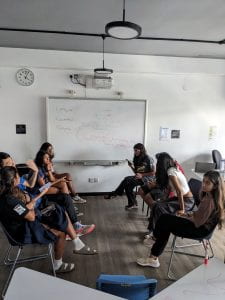 From the beginning one of the ideas in the Debate club was that we would debate on contemporary issues. However, this got lost in a push to get good topics that had lots of stuff to engage with and not be too one-sided. The issue we kept running into is that when you really get down to it, most controversial issues are actually fairly one-sided when it comes to actual facts.
From the beginning one of the ideas in the Debate club was that we would debate on contemporary issues. However, this got lost in a push to get good topics that had lots of stuff to engage with and not be too one-sided. The issue we kept running into is that when you really get down to it, most controversial issues are actually fairly one-sided when it comes to actual facts.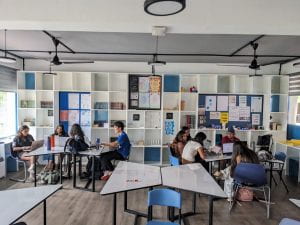 We had one full session of research, but most people couldn’t make it because of classwork reasons. That meant that when it came to debating today, a lot of people were surprised and were disorganized as a result. They made it, though. They organized arguments and got into debating position. I didn’t end up debating with them, though. Aura couldn’t make it today so I had to adjudicate, and I tried to help both teams equally in research- although ultimately I think both teams needed more support than I could give.
We had one full session of research, but most people couldn’t make it because of classwork reasons. That meant that when it came to debating today, a lot of people were surprised and were disorganized as a result. They made it, though. They organized arguments and got into debating position. I didn’t end up debating with them, though. Aura couldn’t make it today so I had to adjudicate, and I tried to help both teams equally in research- although ultimately I think both teams needed more support than I could give.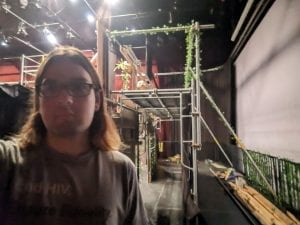
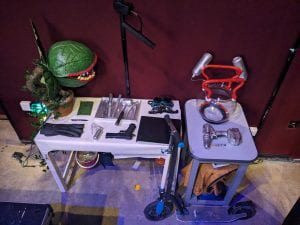
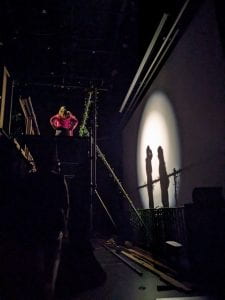 I actually get a pretty nice view of the stage from my position manning a table just to its left. I get to look up at characters on the bridge when they go there, and while there isn’t always something there, it can create awesome images occasionally.
I actually get a pretty nice view of the stage from my position manning a table just to its left. I get to look up at characters on the bridge when they go there, and while there isn’t always something there, it can create awesome images occasionally.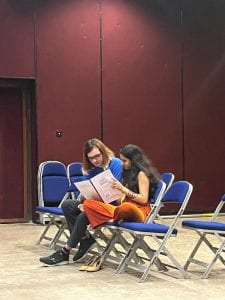
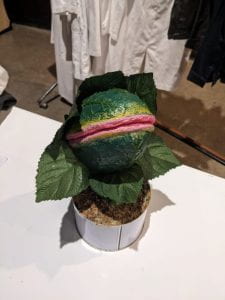
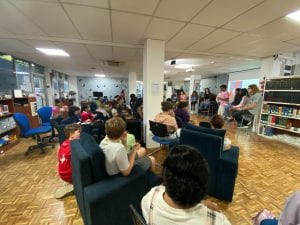

 We had to to physicalize our first idea about how to portray something, which as I had discovered before is not my brain likes doing things. That was a pretty small part, though. Overall that activity was awesome. In the end we split into two groups and staged a section of an old malaysian play, and personally I think my group did it much better.
We had to to physicalize our first idea about how to portray something, which as I had discovered before is not my brain likes doing things. That was a pretty small part, though. Overall that activity was awesome. In the end we split into two groups and staged a section of an old malaysian play, and personally I think my group did it much better.



